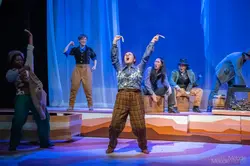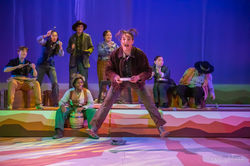William W. Lewis
Scholar /Educator / Performance Maker
Men on Boats
by Jaclyn Backhaus
2022 - Purdue University Mainstage
Jacyln Backhaus’ Men on Boats presents a humorous re-historization of the mythic ideals of manifest destiny, American expansion, colonization of new territory, and tropes related to the heroic idealism of the old West. The story is based on the historical 1869 rafting expedition led by John Wesley Powel to map the Green and Colorado rivers through the territories we know today as Wyoming, Colorado, Utah, and Arizona ending where the Grand Canyon opens into Nevada. On its surface, the play is a about the journey, the hardships, and the comradery between the men on the boats as they deal with the dangers of the canyon. But the playwright asks us to look beyond the historical narrative through the direction to cast actors who are anything but cis-male and Caucasian. In doing so, Backhaus problematizes binary distinctions within historical narratives asking the audience to rethink the role the individual plays within the shaping of history. The play becomes a conceptual mapping where lands, peoples, and cultures are re-defined by highlighting their erasure. It reminds us that maps are made often ignoring the fact that what is there has already been charted and given a name by the original caretakers and inhabitants of the land. If the nostalgia of the American West is invoked, it is done so to amplify the voices of those who were not allowed to have a presence in the historical record. What makes the play so enjoyable to the audience though is it does all this heavy lifting in a comedic and lighthearted manner without being satire or parody.
As a production team, we have embraced the dynamics presented through the casting guidance and utilized the interplay between multiple binaries to seek new ways of looking at our past as a reflection of potential futures. The overarching metaphor is that of flow and fluidity and its relationship to stasis, rigidity, and control. The flow of time, the flow of water, the flow of progress, and the flow of impossibly searching. The flow of the river cuts through rock to form canyons and in doing so creates new layers upon layers of memory, history, and settlements of understanding. Through flow we embrace the power of water to both guide and shape our perspectives both figuratively and literally. Water propels our adventurers forward while also impeding their forward momentum through it’s at times hostile dynamics. These adventurers, both historic and contemporary, exploring simultaneously time, geography, and legacy are caught somewhere in the interplay between what is documented and what actually exists as they attempt to harness the power of flow to find a better future like the reveal into a new world found at the terminus of the Grand Canyon.
 |  |  |  |  |  |
|---|---|---|---|---|---|
 |  |  |  |  |  |
 |  |  |  |  |  |
 |  |  |